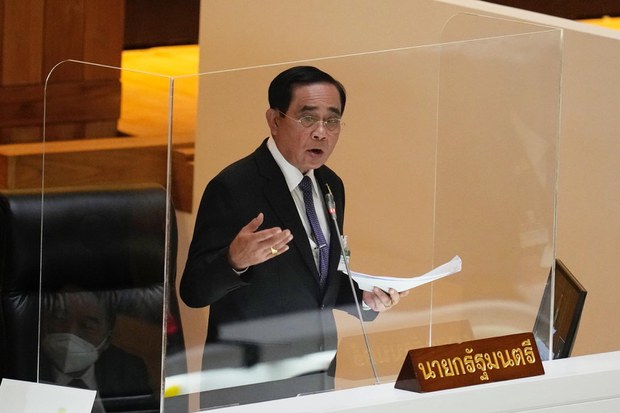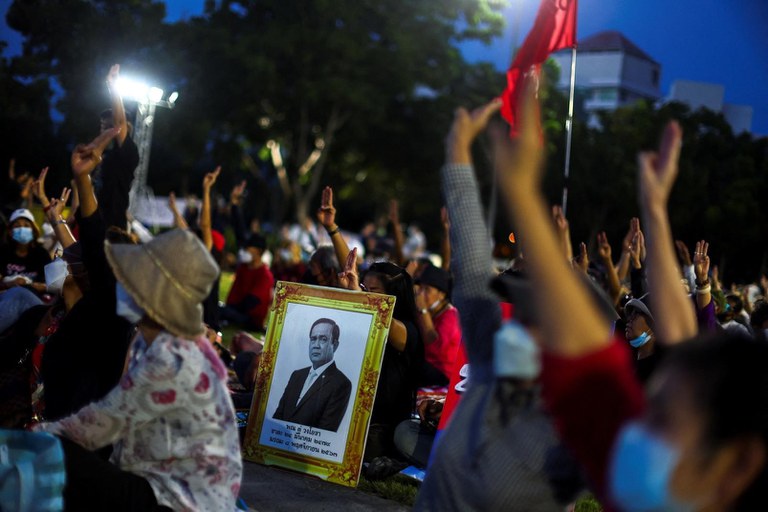Thai opposition parties push for Constitutional Court ruling on Prayuth’s term
2022.08.17
Bangkok
 Prime Minister Prayuth Chan-o-cha answers questions during a no-confidence debate, which he survived, at the Parliament in Bangkok, Thailand, July 19, 2022.
Prime Minister Prayuth Chan-o-cha answers questions during a no-confidence debate, which he survived, at the Parliament in Bangkok, Thailand, July 19, 2022.
More than 150 opposition parliamentarians petitioned the speaker of the house on Wednesday to seek a Constitutional Court ruling on whether Prayuth Chan-o-cha can stay in power past Aug. 24, arguing his eight-year-term ends on the date he became prime minister after a 2014 military coup.
The petition marks the latest attempt by the opposition and Prayuth’s critics to remove the former junta chief from office after he survived a fourth parliamentary no-confidence vote last month.
Chonlanan Srikaew, leader of the main opposition Pheu Thai Party, submitted the petition to Lower House Speaker Chuan Leekpai that 171 lawmakers had signed.
“I believe the parliament will be able to forward the petition to the court by Aug. 22, and I am confident that the court will accept this case for their consideration, but [we] don’t know about the time frame for consideration,” Chonlanan told reporters Wednesday.
Prayuth, a 68-year-old retired general, as chief of the Royal Thai Army in 2014, seized power when he led a coup that overthrew a democratically elected government. After Thailand amended its constitution in 2017, parliament elected him prime minister after the 2019 general election.
Those were the first national polls since the coup, but critics say the new charter was designed to keep the junta in power.
The petition is based on Article 158 of the constitution, drafted by a military-appointed council in 2017, which states the prime minister “shall not hold office for more than eight years in total, whether or not holding consecutive term.”
Prayuth’s critics and opposition parties argue that his term started on Aug. 24, 2014 – about three months after the coup – when the king officially endorsed him as PM following a vote by a legislature dominated by junta-picked lawmakers.
Some of Prayuth’s defenders, on the other hand, say his tenure started on April 6, 2017, when the current constitution was ratified, saying that it was not retroactive. Others, meanwhile, claim his start date should be July 10, 2019, when the parliament elected him prime minister.
“I am confident that the court will look at the facts, the legal provisions and the spirit of the constitution, especially that the charter didn’t want the PM to stay too long to prevent him from monopolizing power,” Chonlanan said.
After accepting the petition, Chuan, the house speaker, told reporters that he planned to study it before sending it to the court in a day or two.
In addition to seeking a ruling on Prayuth’s term, the petitioners are asking the court to issue a temporary injunction to stop him from working as prime minister. They argued that if the court rules that his term ends on Aug. 24, Prayuth or his deputy could lead a caretaker government until the next election, which is slated to occur between March and June 2023.
On Wednesday, Prayuth declined to comment to local reporters.
Piyapong Phimpaluk, a political analyst at the Chiang Mai University, said he believed the court would rule for Prayuth.
“Everybody knows this constitution was written for Prayuth to carry on his duty for another term. ... Therefore, I think this may not end Prayuth’s term,” he told BenarNews.

Among many challenges
For Prayuth, this is the most recent in a series of challenges as the country copes with an economy battered by COVID-19 pandemic. Apart from surviving the fourth no-confidence vote in late July, he has fended off youth-led street protests calling for his resignation and for the monarchy to be reformed.
“I believe that the Thai economy is recovering after the COVID-19 situation has de-escalated, and this was because of the prime minister’s guidance, and the recovery is benefitting the country,” his spokesman, Thanakorn Wangboonkongchana, told reporters.
Previously, Bangkok KhaoSod, an online news website, reported that constitution drafters Michai Ruchuphan and Suphot Khaimuk had said in a 2018 meeting memo that Prayuth would complete his eight-year term on Aug. 24.
The opposition MPs reported including the memo as evidence in their petition.
Earlier this week, lawmaker Mongkolkit Suksintharanon filed his own petition on Prayuth’s status to the Constitutional Court on Monday, bypassing the house speaker.
That same day, Keirov Kritteranon, secretary-general of the Ombudsman’s Office, told reporters he accepted a similar complaint filed by an activist and that he likely would decide whether to forward it to the Constitutional Court by the end of this week.
Meanwhile, 51 law professors from 15 Thai universities wrote an open letter on Tuesday to the president of the Constitutional Court, arguing that Prayuth’s term should end on Aug. 24 because he was prime minister when the constitution was adopted in 2017.
In addition, self-exiled former Prime Minister Thaksin Shinawatra said Prayuth should leave office before Aug. 24 to avoid possible damage to the government’s reputation.
“After eight years in power, he should step down and not allow this issue to reach the courts because if the court finds ways to justify having him continue, it would be damaging to the judiciary and the system,” Thaksin said during his bi-weekly talk on social media site Clubhouse on Tuesday.







